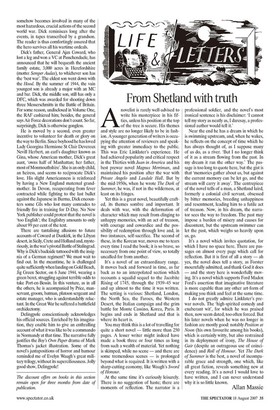From Shetland with truth
Anovelist is rarely well-advised to write his masterpiece in his fifties, unless his position at the top of the tree is secure. His themes and style are no longer likely to be in fashion. A younger generation of writers is occupying the attention of reviewers and speaking with greater immediacy to the public. This was Eric Linklater's experience. He had achieved popularity and critical respect in the Thirties with Juan in America and his best prewar novel Magnus Merriman, and maintained his position after the war with Private Angelo and Laxdale Hall. But by the mid-1950s, when he wrote The Dark of Summer, he was, if not in the wilderness, at least on its fringes.
Yet this is a great novel, beautifully crafted, its themes sombre and important. It deals with war, with the deformation of character which may result from clinging to unhappy memories, with an act of treason, with courage and cowardice and the possibility of redemption through love and, in two instances, self-sacrifice. The second of these, in the Korean war, moves me to tears every time I read the book; it is so brave, so necessary from one point of view, so totally uncalled-for from another.
It's a novel of an extraordinary range. It moves back and forward in time, as far back as to an interpolated section which recounts a squalid sequel to the Jacobite Rising of 1745, through the 1939-45 war and up almost to the time it was written. The setting is various: Shetland, London, the North Sea, the Faroes, the Western Desert, the Italian campaign and the grim battle for Monte Cassino, Korea, Paris. It begins and ends in Shetland and that is where its heart is.
You may think this is a lot of travelling for quite a short novel — little more than 250 pages. A lesser writer might indeed have made a book three or four times as long from such a wealth of material. Yet nothing is skimped, while no scene — and there are some tremendous scenes — is prolonged beyond what is required. It is written with a sharp-cutting economy, like Waugh's Sword of Honour.
At the same time it's curiously leisurely. There is no suggestion of haste; there are moments of reflection. The narrator is a professional soldier, and the novel's most ironical sentence is his disclaimer: 'I cannot tell my story as neatly as, I daresay, a professional author would tell it.'
Near the end he has a dream in which he is swimming upstream, and, when he wakes, he reflects on the concept of time which he has always thought of, as I suppose many of us do, as a river. 'But I no longer think of it as a stream flowing from the past. In my dream it ran the other way.' The passage is too long to quote here, but the gist is that 'memories gather about us, but against the current memory can be let go, and the stream will carry it away'. The centrepiece of the novel tells of a man, a Shetland laird, formerly a colonial civil servant, obsessed by bitter memories, breeding unhappiness and resentment, leading him to a futile act of treason. Now, in his dream, the narrator sees the way to freedom. The past may impose a burden of misery and causes for discontent, but the upstream swimmer can let the past, which weighs so heavily upon us, go.
It's a novel which invites quotation, for which I have no space here. There are passages on almost every page which call for reflection. But it is first of all a story — ah yes, the novel does tell a story, as Forster mournfully admitted, and thank God it does — and the story here is wonderfully moving. It's a novel which supports Ford Madox Ford's assertion that imaginative literature is more capable than any other art-form of making you think and feel at the same time.
I do not greatly admire Linklater's pre- war novels. The 'high-spirited comedy and exuberant wit', for which he was praised then, now seem dated, too often forced. But his later novels when he was no longer in fashion are mostly good: notably Position at Noon (his own favourite among his books), which is certainly witty, but also restrained in its deployment of irony, The House of Gair (despite an outrageous use of coinci- dence) and Roll of Honour. Yet The Dark of Summer is the best, a novel of incompa- rable grace and strength, one which, like all great fiction, reveals something new at every reading. It's a novel I would love to have written, and I can never understand why it is so little known. Allan Massie












































 Previous page
Previous page